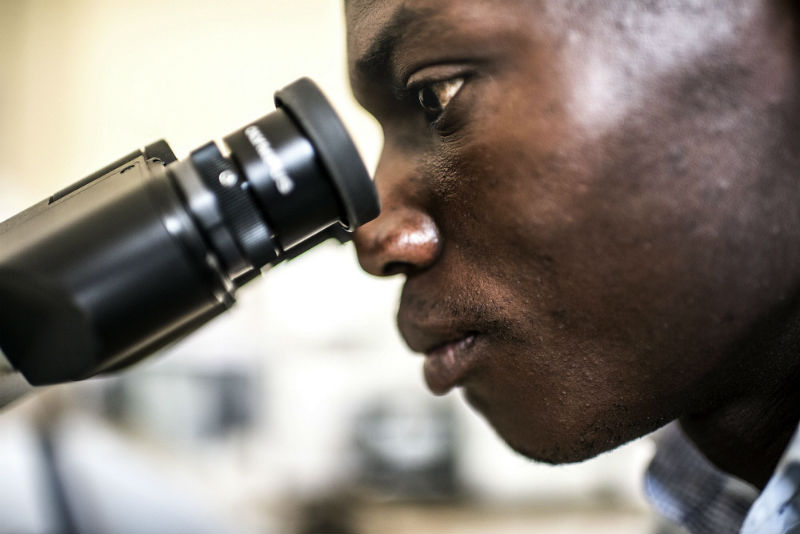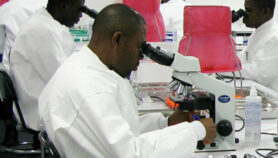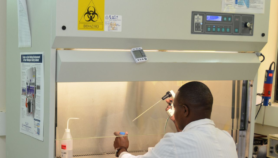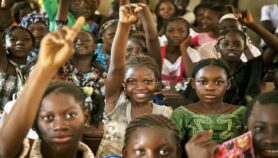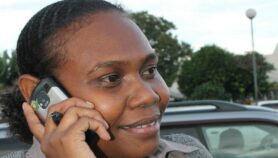By: Alex Abutu
Send to a friend
The details you provide on this page will not be used to send unsolicited email, and will not be sold to a 3rd party. See privacy policy.
Kalu Mosto Onuoha was in January this year inducted as the 18th president of the Nigerian Academy of Science (NAS), the apex scientific body in Nigeria charged with the responsibility of advising the federal government on how to use science and technology as its engine for development.
Having attained 70 years this month, Onuoha retired as a professor of petroleum geology at the University of Nigeria, Nsukka.
In this interview, Onuoha spoke to SciDev.Net on his dream of rebuilding the foundations for research in Nigeria to ensure the government has solid scientific base for national development.
Can you share your mission and aspiration for the NAS?
My mission as the new president of the NAS is to ensure the attainment of the core objective of the academy, which is to bring scientific knowledge to bear on the policies direction of the country and the development and advancement of science, technology, and innovation in Nigeria, and to reposition it to promote the growth, acquisition, and dissemination of scientific knowledge.
Also, to facilitate the use of science, technology and innovation (ST1) to solve problems of national interest.
“We need more investments in fields such as biotechnology and nuclear science.”
Kalu Mosto Onuoha, Nigerian Academy of Science
Under my leadership, we shall also ensure the academy becomes dynamic and capable of responding to changes in society, and modifying and reorganising its structure as conditions in the society demand. Under my watch, we will together as a body of fellows of the academy do our best to meet our vision, maintain societal relevance, and increase the visibility of the NAS in the country.
We will continue to work very closely with the Federal Ministry of Science and Technology to ensure a successful take off of a National Research Council or the government agency charged with funding research and development activities in the country.
Time and effort will be devoted to rebuilding the foundations for research in the nation, and this we hope to do in collaboration with other scientific organisations to ensure that government is provided with sufficient evidence-based information for policy formulation and implementation.
Some scientists have been complaining of the government not involving NAS in developing policies. How do you intend to change that?
In the past, we have been involved in several aspects of policy formulation in the country. We think we can do a lot more for the nation, given the enormous challenges facing Nigeria today. We intend to increase our partnership with the government, especially with other ministries, departments and agencies outside the Federal Ministry of Science and Technology.
Since Obasanjo-led government ended, efforts to launch the science fund to aid research have not received any attention. How do you plan to ensure this becomes a reality under your tenure?
At the 2017 National Science and Innovation Fair that was held in April in Abuja, the government mentioned efforts to launch the science fund. According to the government, a bill will soon go to the national assembly on this issue. Remember that it is the national assembly that will have to make appropriation for the fund. The academy will be involved in lobbying to get the bill setting up the fund to be passed and hopefully will be an active partner in the managing the fund.
Many people see the Nigerian Academy of Science as an association of old and retired scientists. How are you going to attract young scientists into the academy?
Yes, many of the fellows of the NAS are old and retired university professors but the truth is that more young persons are also getting inducted into the academy every year. It is not about age; it is about meeting the requirements of our statutes as they pertain to membership admissions. I was under 51 years of age when I was inducted into the academy. We are always encouraging qualified young colleagues to apply to be fellows of the NAS.
“We will ensure that government is provided with sufficient evidence-based information for policy formulation and implementation.”
Kalu Mosto Onuoha, Nigerian Academy of Science
Nigerian scientists are still migrating in big hundreds to Europe and United States. Do you have any strategy to reverse this situation?
This is a particularly sad situation, especially in the medical field. Hundreds of young doctors are routinely leaving the country and this will not augur well for the nation if the trend is not reversed. This appears to have more to do with the inadequacies in our residency training programmes, the working conditions in the teaching hospitals, and the issue of salaries and remunerations. The federal minister of health, which is a fellow of the NAS, is fully aware of the challenges. These matters should have been addressed many years ago to get the health sector running. The NAS will soon come out with some proposals to help address this problem.
What should the government do to invest in science to propel the country’s development?
The budgetary allocation to the science sector, in my view, is grossly inadequate. I understand the economic situation in the country. These are really lean times for us but the truth is that this is precisely the time to invest in science, technology and innovation (STI). This is because innovations in science and technology will eventually provide the pathway for urgent national recovery from the economic doldrums of the day. The productive sector needs to be revived and STI will always have to anchor that revival. Even in a recession, the science sector should have received more than twice what was allocated for the year 2017.
Money has to be made available for research. Nigeria is a country where most master’s and doctoral students in universities pay for their research from their pockets. A doctoral thesis, for example, is supposed to solve a problem, which means that someone somewhere should be interested in the result or waiting for a solution to a problem. This means that there should be someone or an agency ready to partner or pay for the research work. Right now, such agencies are few and are often restricted to a few areas of research.
The Petroleum Technology Development Fund, for example, used to offer research grants annually to those working on petroleum-related themes but we need to fund research into other areas outside the petroleum sector such as the social sciences.
Grants from the Tertiary Education Fund to the universities are also grossly inadequate, and even those are for now not available to those working in private universities. Investing in STI could help the country rebuild the foundation for research.
Q&As are edited for length and clarity.
This piece was produced by SciDev.Net’s Sub-Saharan Africa English desk.


